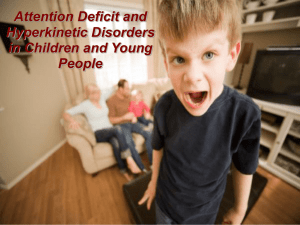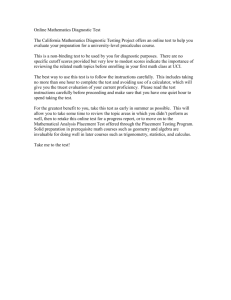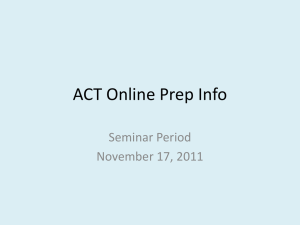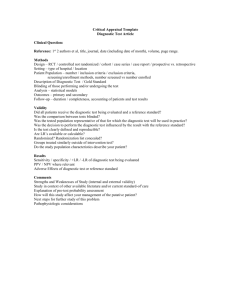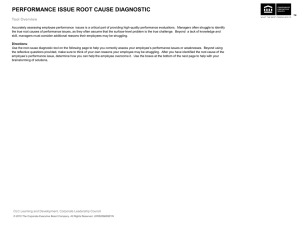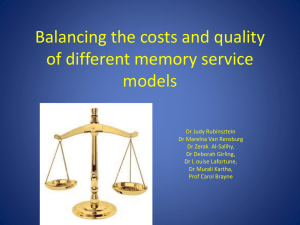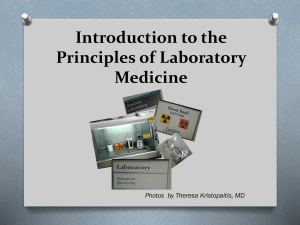Making Diagnostic Impressions:
advertisement
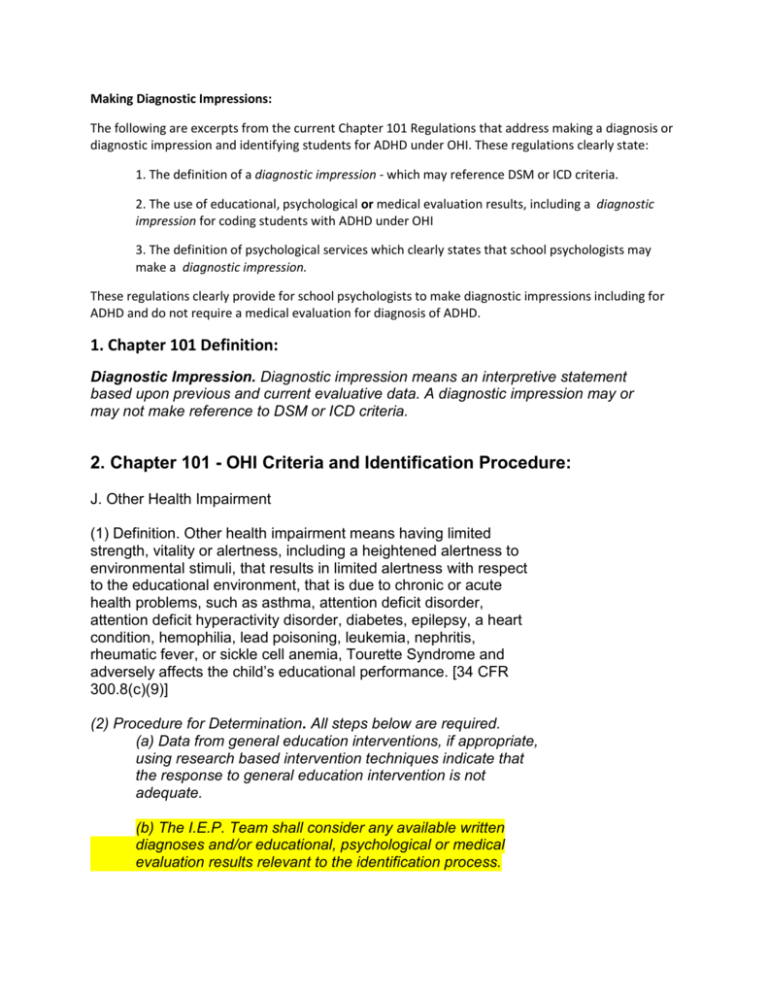
Making Diagnostic Impressions: The following are excerpts from the current Chapter 101 Regulations that address making a diagnosis or diagnostic impression and identifying students for ADHD under OHI. These regulations clearly state: 1. The definition of a diagnostic impression - which may reference DSM or ICD criteria. 2. The use of educational, psychological or medical evaluation results, including a diagnostic impression for coding students with ADHD under OHI 3. The definition of psychological services which clearly states that school psychologists may make a diagnostic impression. These regulations clearly provide for school psychologists to make diagnostic impressions including for ADHD and do not require a medical evaluation for diagnosis of ADHD. 1. Chapter 101 Definition: Diagnostic Impression. Diagnostic impression means an interpretive statement based upon previous and current evaluative data. A diagnostic impression may or may not make reference to DSM or ICD criteria. 2. Chapter 101 - OHI Criteria and Identification Procedure: J. Other Health Impairment (1) Definition. Other health impairment means having limited strength, vitality or alertness, including a heightened alertness to environmental stimuli, that results in limited alertness with respect to the educational environment, that is due to chronic or acute health problems, such as asthma, attention deficit disorder, attention deficit hyperactivity disorder, diabetes, epilepsy, a heart condition, hemophilia, lead poisoning, leukemia, nephritis, rheumatic fever, or sickle cell anemia, Tourette Syndrome and adversely affects the child’s educational performance. [34 CFR 300.8(c)(9)] (2) Procedure for Determination. All steps below are required. (a) Data from general education interventions, if appropriate, using research based intervention techniques indicate that the response to general education intervention is not adequate. (b) The I.E.P. Team shall consider any available written diagnoses and/or educational, psychological or medical evaluation results relevant to the identification process. (c) Current diagnostic criteria must have been considered in making the diagnosis or diagnostic impression. (d) The I.E.P. Team shall review written reports of observations conducted across settings including observations within the educational environment, if the child is participating in an educational environment. These observations must include a comparison of the referred/identified student’s behaviors to same-aged peers’ behaviors from the same environment. (e) When considering eligibility due to an attention deficit hyperactivity disorder, diagnostic impressions of ADHD must be based on a multi-method and multi-informant assessment process conducted across multiple environments including the educational setting for children participating in an educational setting. Methods for ADHD assessment must include at least the following: Psychosocial History; Clinical interviews; Structured observations of the child’s behavior in the educational setting; Behavior rating scales measuring features of attention, hyperactivity and impulsivity across multiple settings including the educational setting; and Measures that rule out other disorders that may manifest with similar symptoms. (f) A child with a medical condition listed under Other Health Impairment may also be eligible under another category if he or she meets the criteria for that other category and needs special education and related services. All children who have one or more of the conditions listed under Other Health Impairment are not necessarily eligible to receive special education services under IDEA. 3. Chapter 101 - Psychological Services: Psychological services includes— i. Administering psychological and educational tests, and other assessment procedures; ii. Interpreting assessment results offering diagnostic impressions; iii. Obtaining, integrating, and interpreting information about child behavior and conditions relating to learning; iv. Consulting with other staff members in planning school programs to meet the special educational needs of children as indicated by psychological tests, interviews, direct observation, and behavioral evaluations; v. Planning and managing a program of psychological services, including psychological counseling for children and parents; and vi. Assisting in developing positive behavioral intervention strategies. A certified school psychologist or psychologist licensed by the Board of Examiners of Psychologists may provide consultation services to children, school staff members and parents; evaluation services for children; behavior management including assisting in designing, implementing, evaluation and modifying positive behavioral intervention strategies; and social skills training (including individual or group counseling for children). Psychologists may provide psychotherapy if required by a child with a disability and specified in the child’s IEP. A certified school psychologist may offer diagnostic impressions.
